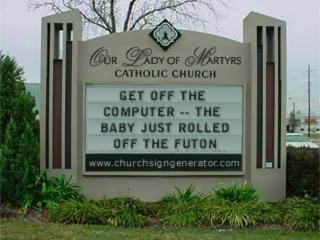This image for the determination of one's salvation has a certain utility in that is simple and evocative. C. S. Lewis uses it in The Last Battle, where all of Narnia's creatures face Aslan and swerve either to his right (with loving expressions) or to his left (with hate in their eyes). And yet, like any image or illustration, applying it absolutely leads to distortion. The 'encounter God and choose' image helps to emphasize that God's judgment is not some arbitrary judgment imposed upon us. It also helps to explain how someone externally appearing to have sinned many times might be saved, while someone who to all appearances led a virtuous life, yet held pride in his heart, might reject God and be condemned. And yet, taken as an absolute of 'salvation by choice alone' the theory of 'fundamental option' becomes just as much a heresy as 'salvation by faith alone'.
John Paul II said as much in Veritas Splendor:
To separate the fundamental option from concrete kinds of behavior means to contradict the substantial integrity or personal unity of the moral agent in his body and in his soul. A fundamental option understood without explicit consideration of the potentialities which it puts into effect and the determinations which express it does not do justice to the rational finality immanent in manÂ’s acting and in each of his deliberate decisions.It is keeping this integrity between the human agent's identity, will and action that is the difficult balance for most of us, I think. Our culture is tends to think of each choice as a totally free activity. Thus, the idea of experiencing for an instant the clarity of the Beatific Vision and in that instant choosing for or against God seems like an isolated decision point, unencumbered by past decisions. Indeed, some use this view to support the claim that perhaps all will be saved, because no one (when truly seeing God for what He is) would reject Him.
And yet, classic Christian moral theology does not support this view of total personal freedom. Virtue is often described as 'the habit of doing good' while attachment to sin is that moral habit which, once one has sinned, makes it hard to make the right choice in the future. Thus, the first time you lie in order to get out of a difficult situation, you struggle to make it come out convincingly and fear for days that your lie will be found out. But with each transgression the lie comes more naturally, until it becomes nearly impossible to tell the truth in a difficult situation -- the convenient lie comes out without even thinking.
It is because we are changed as moral agents by our past choices that ourfundamentall choice for or against God at the particularjudgmentt cannot be divorced from the moral decisions we have made throughout our lives. Each time we sin or resist sin, make it harder of easier to make that decision at the moment of personaljudgmentt.
Perhaps, as in so many other things, the analogy of marriage is useful. One can, as a moral agent, choose at any given point in one's marriage to do something that is good for or bad for one's spouse. And yet, a given man with a given history can make it harder or easier to treat his wife well by building a history of good or bad behavior. While, in theory, a man who has lied and mistreated and been unfaithful to his wife can still, at any given decision point, choose to treat her well, he has vastly decreased both his ability to treat his wife well, and also his knowledge of what his wife truly wants, and thus his ability to treat her well even if he wants to.


















